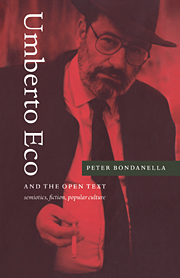Book contents
- Frontmatter
- Contents
- Preface
- ONE Umberto Eco's intellectual origins: medieval aesthetics, publishing, and mass media
- TWO The Open Work, Misreadings, and modernist aesthetics
- THREE Cultural theory and popular culture: from structuralism to semiotics
- FOUR From semiotics to narrative theory in a decade of radical social change
- FIVE “To make truth laugh”: postmodern theory and practice in The Name of the Rose
- SIX Interpretation, overinterpretation, paranoid interpretation, and Foucault's Pendulum
- SEVEN Inferential strolls and narrative shipwrecks: Six Walks and The Island of the Day Before
- EIGHT Conclusion
- Bibliography
- Index
THREE - Cultural theory and popular culture: from structuralism to semiotics
Published online by Cambridge University Press: 23 October 2009
- Frontmatter
- Contents
- Preface
- ONE Umberto Eco's intellectual origins: medieval aesthetics, publishing, and mass media
- TWO The Open Work, Misreadings, and modernist aesthetics
- THREE Cultural theory and popular culture: from structuralism to semiotics
- FOUR From semiotics to narrative theory in a decade of radical social change
- FIVE “To make truth laugh”: postmodern theory and practice in The Name of the Rose
- SIX Interpretation, overinterpretation, paranoid interpretation, and Foucault's Pendulum
- SEVEN Inferential strolls and narrative shipwrecks: Six Walks and The Island of the Day Before
- EIGHT Conclusion
- Bibliography
- Index
Summary
The Open Work and Misreadings established Umberto Eco's reputation both as a serious theorist of contemporary culture and as a popular writer whose style was colored by a rare sense of humor and subversive wit. While seldom identifying himself completely with any particular political party or platform, Eco had nevertheless emerged as a representative of the cultural left, clearly believing in the necessity of incorporating the aesthetics of popular culture into contemporary intellectual discourse. This belief represented a notion that many of Italy's older intellectuals found to be simply a contradiction in terms: aesthetics, by definition, could deal only with high culture. The fact that Eco believed strongly in the existence of an aesthetics of popular culture and that it should be analyzed seriously (an even more scandalous belief) set his writings apart from traditional literary criticism of the period, still dominated either by old-fashioned Crocean idealism or the newer Marxist literary criticism that all too often envisioned a quite mechanical relationship between superstructure (culture, either high or popular) and substructure (the means of production), between ideology and economics. In formulating his theories on popular culture and presenting a number of influential essays on various aspects of mass-media culture in comic strips, films, and pulp novels, Eco aimed not only at going beyond the older Crocean idealism (which would hardly deign even to recognize the existence of popular culture) but also to navigate carefully between various Marxist points of view (from Lukács to Gramsci), while accepting the basic Marxist premise that culture does, indeed, reflect the ideology of the class with hegemony over society.
- Type
- Chapter
- Information
- Umberto Eco and the Open TextSemiotics, Fiction, Popular Culture, pp. 41 - 66Publisher: Cambridge University PressPrint publication year: 1997



